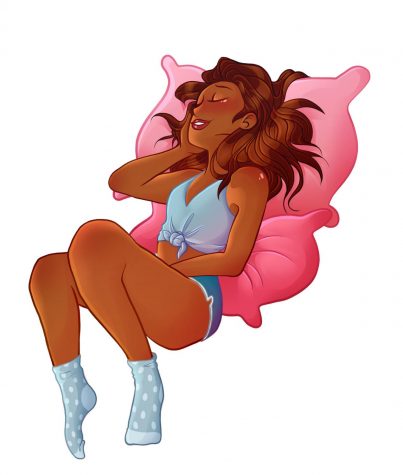Editor’s Note: Make sex fun again
February 9, 2020

As a child, I learned what rape was before I had a coherent understanding of what sex was. And even when I learned about sex, it was taught to me by my family, my friends and my educators through the male gaze.
For the majority of my life, I believed sex and my body were only meant to be this way—a means of pleasure for men and stigmatized no matter the context. I thought about whether the sleeves of my clothes were too revealing of my shoulders before I thought about whether I remembered to pack my chemistry textbook; I tucked tampons into the sleeve of my sweaters shamefully in between classes, more concerned with someone catching sight in the hallway than vomiting from pain; I avoided wearing clothes or saying things that might deem me promiscuous in the eyes of society rather than focusing on enjoying my life.
As a result, I spent most of my life not wanting to talk or even think about sex. To me, it was shameful, an elephant in every room of my life. When sex was portrayed by actors onscreen, my face felt hot; when my mother explained to me what ejaculation was, my teeth gritted; when I bought tampons and Midol from the grocery store, I hid them under trashy magazines and chocolatey candy bars; and whenever I heard of girls at my high school hooking up with people, I thought un-feminist things.
Slowly as I grew older, more independent and more desensitized to shame, no longer confined to the boundaries of a small, conservative town in the countryside of Illinois, I grew out of this way of thinking. I bought lingerie not for the visual pleasure of my partners but for my own enjoyment; I came into my sexuality by my own merit, not for the societal categorization; I stopped tucking tampons into my shirt on the way to the restroom as if I were carrying a nuclear arsenal through enemy terrain; I dress in the morning based on my own creativity rather than being worried how “slutty” I may look; I even stopped taking birth control medication, which had not only robbed me of my personality and emotion but had perpetuated the painful symptoms for which I sought out the medication in the first place. What’s more, I didn’t avoid the cultural discussion of sex anymore—it no longer felt shameful to me the more I accepted it into my life on my own terms. Playing Cards Against Humanity with my teenage siblings and older relatives, I didn’t blush at the mention of “clitoris” or “oral sex” like my counterparts did.

Sex isn’t shameful, it’s just framed that way for women and nonbinary people in society so the male gaze can dictate our actions.
Sex is full of potential—and it isn’t just limited to intercourse between a man and a woman. As you will read in the pages of the Chronicle’s annual Sex Issue—themed entirely around the destigmatization of sex—it can be about threesomes or asexual masturbation or orgasmic climax. Sex can also be deeper than physical pleasure; it also encompasses consent in public and in private spaces; it begs action when that consent is broken; and it defines the very fabric of society, seen even in how menstruation impacts people’s work or student commitments.
Sex is also diverse and should never have been viewed strictly through a white, heternormative lens. Not only are there several sexual orientations represented in the pages of this issue, but there is also a rainbow of body types, races, genders and abilities; everyone can share in the spoils of the bedroom.
Sex is a choose-your-own-adventure and continuing to stigmatize it only dampens those beautiful possibilities.







